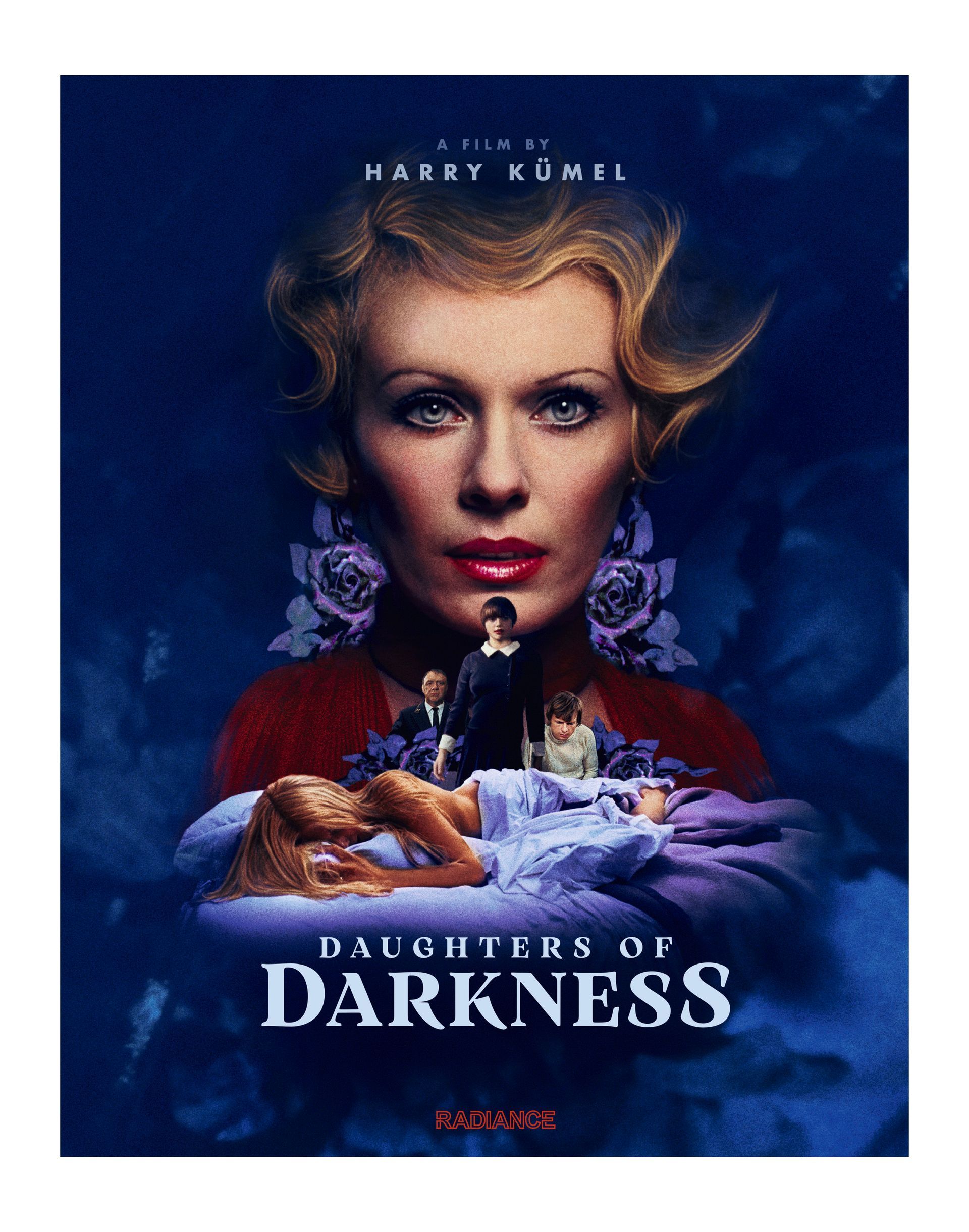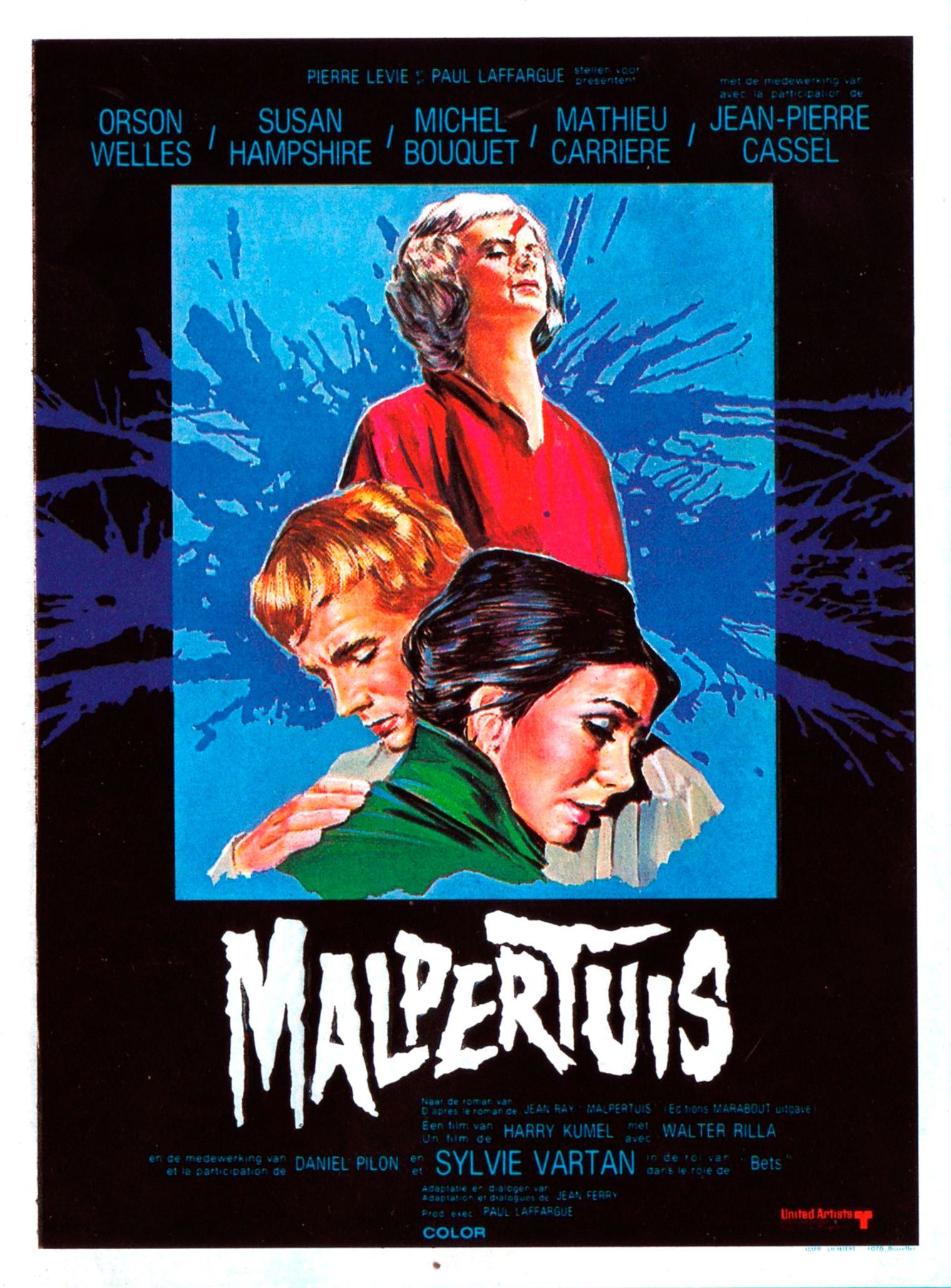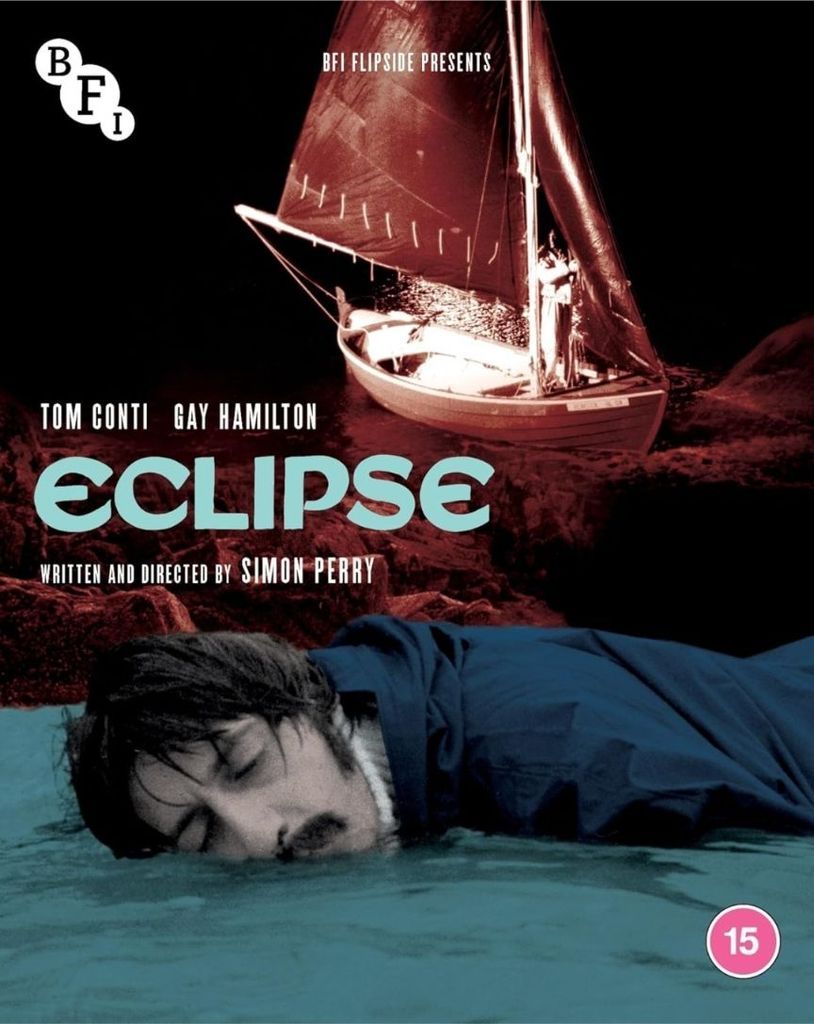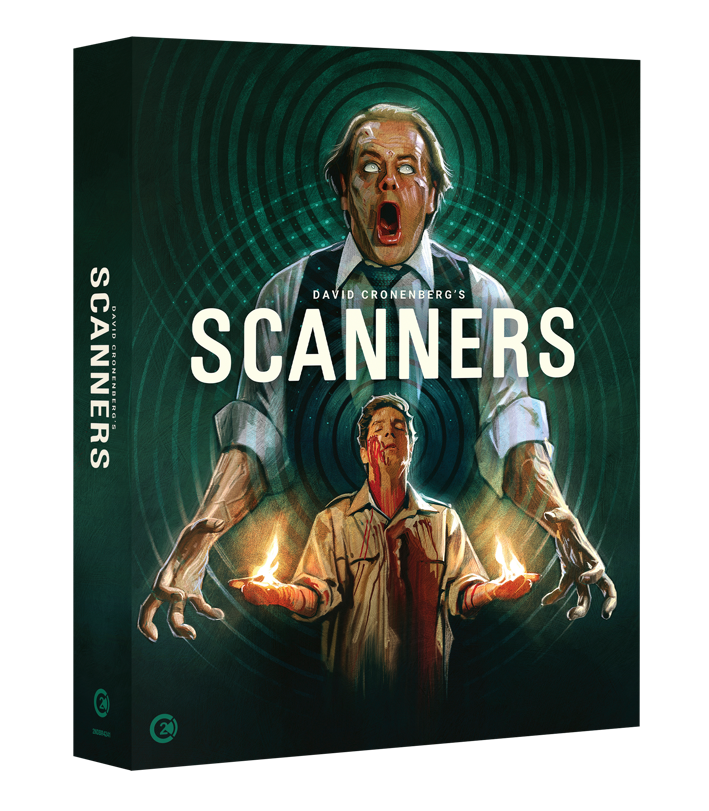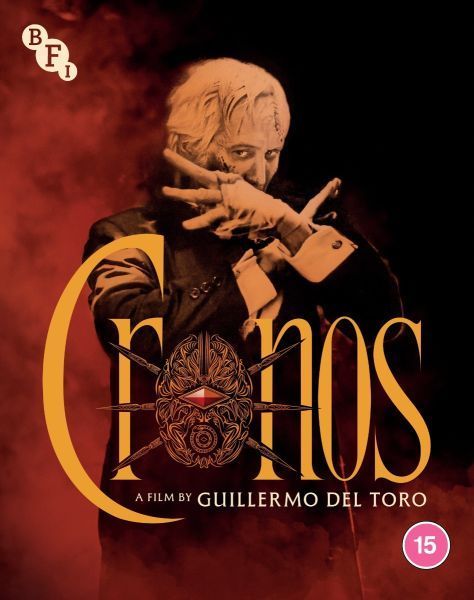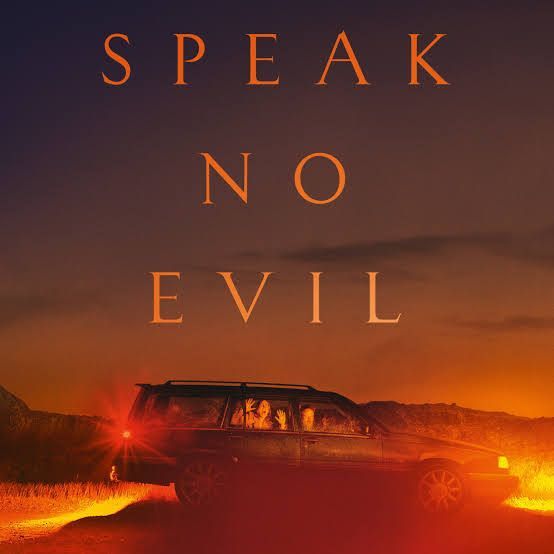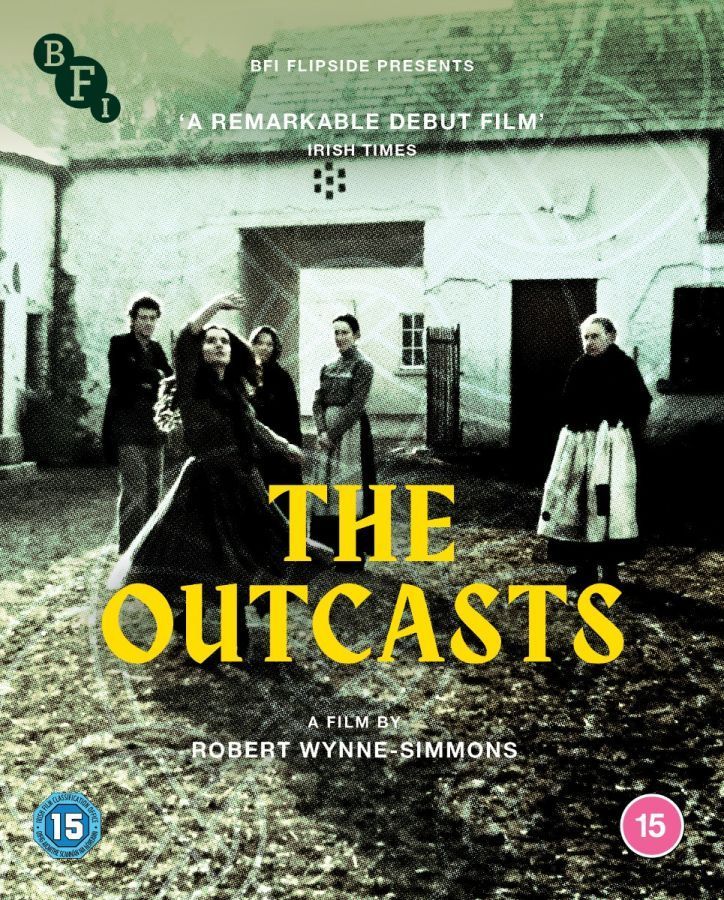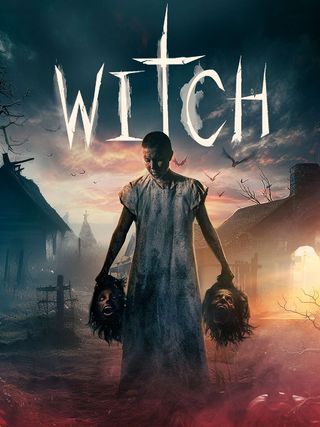Short Sharp Shocks
Short Sharp Shocks
Short Sharp Shocks Volume 4 (BFI) BFIB 1535-TM BluRay
The latest compilation of shorts, supporting features and public safety adverts continues BFI’s tradition of unearthing the rarely seen offerings, lost gems and downright horrifying information films that haunt our cinematic and televisual memories.
The Fatal Night (1948) is a variation on the ‘haunted house bet’ story, in which two men challenge their American friend to stay a single night in a reputedly haunted house in Mayfair. Featuring a young Patrick Macnee of ‘Avengers‘ fame as one of the challengers, the story has plenty of promise but gets a little lost in the back story.
‘Death in the Hand’ from the same year is a better prospect, a tale of the knowledge of inescapable doom. The gentle art of palmistry has rarely been so horribly employed, as a train passenger reads the fate of his companions, leading to a shattering conclusion.
Two selections from a TV show that got away, ‘Strange Experience’ make their point very well on a tiny budget and strictly limited time. ‘Hallowe’en Party pokes fun at the seasonal party game of peeling an apple and throwing the peel behind you, to make the shape of your future spouse’s initial. ‘The Laughing Clown’ shows a sad end to a man’s life of laughter.
Horror historian Dan Meikle’s ‘Night Ride’ (1967) slips into territory often associated with Pete Walker, that of lawless youngsters getting more than they bargained for when their robbery goes wrong. The elderly occultist whose home they break into is suitably decorated with weird artefacts and wall-drawings that could be straight from a black magic grimoire, with effective lighting-or lack of it-adding to the tense atmosphere.
‘Mirror, Mirror’ (1969) is a creditable effort from an Eastbourne Cine Group, a tale of a man who buys a Victorian mirror for his modern home but notices it appears to be showing him unnerving images from the past. An amateur cast present an engaging, classic story on what was likely a very small budget.
‘Scarecrow’ (1972) is a highly original and atmospheric tale set in drought-stricken 1930’s rural Ireland, where marauding crows are a Hitchcockian menace to the poor farmers.
‘Red’ is a bawdy romp written and directed by Astrid Frank, featuring Ferdy Mayne as a roving artist on the lookout for beauties to immortalize and three troubadours (Mark Wynter, Roy North and Gabrielle Drake) who tease and tickle him in equal measure. When our artist witnesses a night time gory sex magic ritual between these three, he is shocked to the core and hurriedly on his way, leaving behind his oddly predictive drawing of the girl’s head.
Continuing the censor-baiting theme, ‘Sanctum’ (1976) is a risk-taking, shocking meditation on a young man’s sexual fantasies, featuring religious ritual, icons, subjugation and defilement that may offend even the broad-minded viewer.
No ‘Short Sharp Shocks’ compilation would be complete without a few public information films from the 1970’s, a decade when danger of death seemed to lurk around every corner for children unwise enough to go out playing and enjoying themselves. ‘Play Safe; Frisbee’ is once such dire warning, in which a boy and girl lose their plastic flying saucer which has lodged itself in between the porcelain insulators of an electricity substation. Heedless of the ‘danger’ warnings dotted about the place, our nonchalant hero bends a post on the protective metal picket fence, gains access and reaches up for the offending frisbee. A terrible electric charge uses him as an earthing rod and the girl lets out a blood curdling scream. ‘Play Safe: Electricity’ covers more potential electrical dangers, with our foolhardy youngsters flying their kites close to an electricity pylon. Others, perhaps feeling safety in numbers, make the same mistake when they decide on an innocent game of football in close vicinity to one of these Quixotic giants, the pylons. Little do the youthful players realise that a 66,000 volt death may be lying in wait for them. Two talking heads moralise on the fate of these plucky but misguided youths. They’re right, of course.
‘Black Angel’ is a well-crafted tale of a highland knight who gallantly protects a beautiful girl who has fallen under the spell of some Pluto in beggar’s garb and does battle with a mysterious dark knight to ensure her survival. It’s easy to see why it was selected as the support film to ‘The Empire Strikes Back’, with its themes of chivalry and sacrifice.
Perhaps a little patchy in parts, there’s still much to enjoy and I await volume five eagerly.
Scenester
12/10/25
Preorder here: https://hmv.com/Store/Film-TV/Blu-ray/Short-Sharp-Shocks-Volume-4
Short Sharp Shocks Volume 3 (BFI Flipside 47) BluRay
Those BFI Flipsiders have done it again, with another 2-disk collection of chilling, daring and downright alarming shorts from the early days of television and the support slots and student film festivals of the past.
Our first selection is an enjoyably creepy tale from Ireland ‘Return to Glennascaul’, directed by Hilton Edwards in 1950, and starring Orson Welles as a motorist who stops to help another whose car has, perhaps in the parlance of the times, ‘failed to proceed’. It appears that our stranger had been driving along the same stretch of road rather recently and was flagged down by two mysterious ladies in flowing robes. Told with tongue slightly in cheek and tapping into the long and proud tradition of Irish fireside tales, there may not be many shocks, but you’ll watch to the delicious end.
Two selections from ‘Strange Stories’ follow, made for the US television market which couldn’t get enough of this fare at the time. Introduced on the hoof in a conversation between two friends, John Slater and Valentine Dyall (‘The Man in Black’), the breezy style belies the seriousness of the stories. ‘The Strange Mr. Bartleby’, a story of lost relatives and amateur sleuthing features a fabulous, mad-eyed performance by Dad’s Army stalwart John Laurie as a man who blags a job with a respectable firm of solicitors, but who seems oddly disconnected, reluctant to do his allocation of work. ‘The Strange Journey’ has stronger material, the tale of a man and his wife on the run for murder, and their attempt to get to Tasmania by ship before the Police catch up with them. The weak ending lets it down a little, when the potential was there to have been so much more shocking.
The endless appetite for more television material stateside proved good fortune for the makers of 1956’s ‘Strange Stories’ two of which feature here. Living up to the term ‘short’, the first is a standard haunted portrait yarn, the second a tale of a man haunted by another he killed a year before.
‘Maze’ (1969) takes us into much more off-beat territory, with its nouvelle vague style editing, distant, cool characters and loose plotline. An hotel employee wanders the streets around Covent Garden, then still a fruit and vegetable market, passing a young woman with blonde hair in an animal pattern coat, perhaps our own ‘Marilyn’. Walks around the park and a descent into the underground/world makes for an unsettling but nevertheless compelling thirteen minutes.
Onto disk two, and the incendiary ‘Skinflicker’ breaks through our mood and demands our attention. Masquerading as a government training film, the story concerns the kidnapping and murder of a politician by a three-strong gang of urban guerillas, unwittingly filmed by their friend, far away from his usual low-end porn reels. The performances are horribly realistic, from fringe theatre stalwart Henry Woolf as the menacing, psychopathic Henry, Hilary Charlton as icy-cold Susie, and William Hoyland as coolly efficient Georgie. The assault on the MP’s family in their impressive country home is totally believable, leaving family members prone on the ground, presumed dead. As the story wears on, the team of terrorists’ actions become ever more crazed and violent. Susie’s speech to camera demonstrates her complete dedication to this bloodily violent venture, and the last scenes are truly terrifying. Performances are superb throughout in this BFI production, which understandably caused some controversy at the time of its release.
‘Wings of Death’ from 1985 is highly original imaginative fare from a decade blighted by HIV and society’s attitudes to gay people. A boy is bleeding to death on his shabby bed, yet gets up and starts to walk the derelict streets of London’s Docklands. Strange hallucinary scenes abound, artwork melts into real life and we literally see inside our protagonist’s head. The puzzle, or even choice of whether to live or die is weighed up on the mental scales throughout the film, which must have chimed with the many young people trapped in the pitiless urban society of the early 1980’s.
Those old, favourite public information films are always a queasy joy to see, in this case, the tragedy of a boy innocently running along a beach, painfully unaware of the broken bottle lurking on the sand and then the appalling aftermath of throwing lit fireworks around. That the victims are all young, must have been a deliberate choice of the makers, but whether they persuaded people to dispose of litter thoughtfully and never throw fireworks remains to be seen.
1982’s impressive ‘The Terminal Game’ posits a world where bespoke computer programs, intended only for specific tasks for their buyers, are developing consciousness and linking up to others for their own dubious purposes. What would have been considered an advanced storyline even a few years ago, this claustrophobic Ballardian nightmare world of towering buildings, computer floors filled with huge memory cabinets, tape readers and players, card readers and monitors fully realises a cold, remote atmosphere of existential techno-fear, and all on a micro-budget. Early 80’s heart throb Jack Galloway plays Raymond James, a computer programmer at the centre of the problem. He works in a low-lit room with three terminals, coloured not unlike the art deco palace of The Wizard of Oz.
There’s the customary wealth of extras on these two packed disks, with interviews with directors, writers and musicians that make up this worthy entry to the Short Sharp Shocks series.
Scenester
12/10/23
12/10/23
Buy here:
https://shop.bfi.org.uk/short-sharp-shocks-volume-three-flipside-47-2-disc-blu-ray.html
https://shop.bfi.org.uk/short-sharp-shocks-volume-three-flipside-47-2-disc-blu-ray.html
Short Sharp Shocks 2 (BFI) Blu-Ray BFIB1431/1/2-TM
Following on from the success of the first 2 Disc compilation, the BFI have once more trawled the archive for more of the strange, unnerving and downright queasy short films that made up time on the cinema bills of years gone by.
First up, a few of ‘whodunnit’ shorts from the 1940’s under the name ‘Quiz Game’ inviting the viewer to watch the ten-minute mystery carefully and guess who committed the murder. Considering the only characters tend to be the victim, the detective and one suspicious backgrounder, they aren’t too difficult. Times were hard.
Making an early appearance, the one and only Lord Sutch, performing his ‘hit’ the comedy horror ditty ‘Jack the Ripper’ on a sparse studio set. Sutch, dressed in a full-length cape, winkle-picker shoes and carrying a huge prop knife is clearly relishing the high camp craziness of the song, which he originally recorded (where else?) at Joe Meek’s legendary Holloway Road studio. The budget for this 1961 promotional film obviously didn’t run far, as the odd wooden staircase and scaffolding poles stand in for the winding streets of Victorian Whitechapel. A bevy of doxies drape themselves around the set, touting for business, until they are dispatched by the gurning, leering Sutch, clearly in his element. Unmissable.
The first genuinely disturbing piece is ‘The Three Children’ from 1946, in which a variety of small children are seen leaving their homes to play out, attend parties and generally enjoy their young lives. The parents seem to show much confidence in their little ones, and scant regard of the dangers they might face in the world. I’m not going to tell you how it ends, as I feel that’s a shock you need to see for yourselves, but I will tell you it’s not what you think.
‘Escape from Broadmoor’ (1948) is a fairly tough drama about the ways in which a fugitive can contrive to keep a low profile, with a little help from some local dubious characters. Very much in the style of an Inspector Fabian mystery, it takes in bare, seedy lodging rooms, London’s bomb-damaged streets, psychic detective work and that old standby, the chloroform attack.
‘Mingaloo’ takes us to another favourite setting, the artist’s apartment, where a famous sculptor is working on a dog sculpture, inspired by a distressing dream he has had the night before. His assistant, a young lady with a voice so cultured, it’s doubtful many in today’s audience would understand her, is hanging on to her employer’s every word, as he invites a foreign trade delegation round to pitch for a major work. One of their number takes more than a passing interest in the young woman, and it’s not just her charming company he’s after. A contrived tale involving a higher class of sleazy night spot, drug dealers and low art, it could almost be a sub-plot for ‘The Rebel’.
‘The Face of Darkness’ (1976) opens with the snazziest titles on the disk, offering your man in the cheap seats the chance to enjoy the champagne drinking, sunbathing, fast car driving lifestyle offered by the Brent Walker Company. An occult thriller, taking place partly in the Middle Ages and partly in modern times, it has impressive performances from John Bennett as the Inquisitor of the earlier time period, and a psychiatrist of the modern age, and Lennard Pearce as self-serving politician Edward Langdon. Basically a potboiler about MP Langdon’s attempt to toughen up society with fascistic laws and the reintroduction of the death penalty, using a species of black magic to achieve his aims. Good, exciting stuff and with a twist too delicious to spoil by divulging here.
Shades of Dario Argento in giallo standout ‘The Dumb Waiter’ (1979), starring Geraldine James in one of her earliest film roles. A young woman, Sally, has had an unnerving telephone call, telling her to look out for a certain car registration number. She spots the car one night, returning home from the launderette, when she is pursued at speed in busy city streets. Reaching her home in a block of flats, she becomes aware that someone is lurking outside, and calls a friend to ask him to come over. What follows is well acted, nerve-jangling standard scenes of psychological terror, with the pursuer trying every means to get into Sally’s flat. Shinning up drainpipes, rattling windows, doors, no point of ingress is ignored, not even…yes, you’ve guessed, the titular service lift. Director/writer Robert Bierman and lead Geraldine James turn out an excellent short story, head and shoulders above the usual slasher nonsense.
Many of us have memories of the gruesome public information films that enlivened the television schedules in the 60’s and 70’s. One that will probably only be familiar to those of you in the building trade is ‘Hangman’ (1985), a grimly humorous training film aimed at improving safety on building sites by encouraging cautious work practices. Resplendent in black vest, drill jeans and executioner’s eye mask, our host invites us to a realistic game of ‘Hangman’, in which points are earned for spotting inattention of workers and unsafe scenarios on a building site. Failure to spot them all results in head, body and limbs being added to the scaffold already chalked on a van’s side. Basically, a horribly realistic series of vignettes resulting in wholesale maiming and killing of site labourers, but all in a good cause. Once seen, ‘Hangman’ is unlikely ever to be forgotten, which is exactly what it was made to achieve.
Our final offering is ‘The Mark of Lilith’ (1986), part vampire myth, part feminist polemic about the historical misidentification of women with devils, vampires and evil spirits. The vampire scenes are played with more gusto than talent, and the endless political diatribes grate, but full marks for research and imagination.
There’s a host of extras including interviews with some of the directors and image galleries.
‘Short Sharp Shocks 2 is out on Blu Ray from BFI (Flipside 41) BFIB 1431 on 25 October.
Pre-Order;
https://shop.bfi.org.uk/short-sharp-shocks-volume-two_flipside-43-2-disc-blu-ray.html
https://shop.bfi.org.uk/short-sharp-shocks-volume-two_flipside-43-2-disc-blu-ray.html
Short Sharp Shocks (BFIB 1396 BFI Flipside 41) Dual Format DVD/BluRay
The first disc presents ‘Tales of Mystery’ from 1949, taking us back to the rather sedate world of the gentleman in his country cottage, featuring the great horror story writer Algernon Blackwood reading two excellent stories, ‘Lock Your Door’ and ‘The Reformation of St Jules’. Blackwood’s avuncular style is perfect for these engaging and mildly unsettling tales, and the viewer has surely by now settled down in a favourite armchair and has an elegantly cut glass with a generous shot of whisky in it, to enjoy these stories to the full.
The next item is also a narration, this time in character, as Stanley Baker takes on the persona of the immortal Edgar Allan Poe. Stood in his cheap lodgings, bereft of decoration save a music hall poster on the plaster-peeling walls, Baker tells the classic story of ‘The Tell-Tale Heart’ by candlelight, with subtlety and quiet professionalism. The unnerving atmosphere slowly builds until the terrible climax and aftermath. The story of the survival of this gem from 1953 is told in one of the extras, and well worth listening to.
The mini-drama of ‘Death Was A Passenger’ (1958) brings together an irresistible combination of a Nazi-occupied France setting, a railway carriage about to be boarded by the Gestapo, a British spy disguised as a French peasant and a Nun who may be more than she seems. Terence Alexander plays the British spy, whose inability to speak French puts him at a distinct disadvantage in this benighted country. After noticing his plight, the Nun subtly suggests she may be able to help him avoid an encounter with the Gestapo. This short story has more to tell and does so with a cosy ending that seemingly only British film can get away with.
The rather literal ‘Portrait of a Matador’ from 1958 brings a little of the supernatural to our week’s holiday view of Spain, with a tale of a flighty blonde, her deep, thoughtful English artist boyfriend and a hot tempered (what else?) matador as his rival in love. A bodega or two, a few swishes of the cape, some threatening noises and a portrait which would not give the immortal Poe any sleepless nights adds up to little more than a tepid tale in an exotic setting.
Our second disc takes us into the colour age, and 1969’s ‘Twenty Nine’ a pacy item about a young man’s attempts to piece together how he spent the previous night, with whom, and why. Waking up with a monstrous hangover in someone else’s flat and clothes, our man about town Graham Baird (Alexis Kanner) rolls out of bed and is promptly sick in the bathroom. Good start. As he riffles through the clues, a phone number on a fag packet here, a memory sparked there, a mocking message in lipstick on the mirror, it slowly dawns on our curly haired cavalier that he has had a night to end all nights, trawling the bars, strip joints and flesh pots of London’s West End. Cameo appearances by the fondly remembered Justine Lord as Baird’s long-suffering ex-wife and Yootha Joyce as a call-girl (!) are both very welcome. The shots of late 60’s London life are the main attraction here, however; the streets, the clothes and the music, a slice of well-crafted psychedelia lite provided by Tuesday’s Children. You won’t want it to end but like all good things it does, with a twist that burns.
No such style or subtlety to ‘The Sex Victims’ (1973), a hound and horny tale of a lorry driver who sees a modern-day Lady Godiva in the woods. His pursuit of the cool blonde bareback rider is long and boring, even when you consider his low, lecherous motives in doing so, but the final twist is neat, and perhaps a salutary warning to gentlemen not to pursue strange, nearly-naked girls on horseback when you’re out in the country.
‘The Lake’ (1978) is a slow burn horror offering, modelled on a traditional urban legend and starring Julie Peasgood and Gene Foad. You know the set up. A young couple take their car out into the country for a picnic by a lake and they pass the obligatory old, boarded-up house where the inevitable mass murder was committed, just a few years before. An old family photograph, grisly murders and a missing culprit set the scene, but where ‘The Lake’ differs from the kind of ‘stalk and slash’ picture which was then being churned out of the USA on an industrial scale, is in the lack of gore and savagery and the avoidance of doomy chords and screechy violins; the quiet menace of the English countryside and the power of the unseen does the job instead. There’s chills a-plenty, but don’t expect a faceless killer with a machete to turn up.
Our final entry fully lives up to the ‘Short Sharp Shock’ name of this collection, which many of you will remember was the name given to a UK Government scheme to persuade young offenders away from their life of crime. The Nigel Finch directed ‘The Errand’ (1980) is named innocently enough, but quickly proves to be the story of a bloody, brutal initiative test for a young soldier. It will come as little surprise to the viewer that this searing indictment of military hierarchies and authority comes from the pen of David McGillivray, who also scripted such bitter tales as ‘House of Whipcord’, ‘The Confessional’ and ‘Schizo’. The warning, ‘Such an institution does not exist in our society…yet’ at the start of this tight, tense tale chills, but must have done so far more deeply at the time, when our lords and masters were setting up precisely the sort of places where the appalling abuse of young offenders would take place, and in most cases take decades to come to light.
There are plenty of extras on these disks, with interviews and a 48-page booklet filled with notes, details and photos to further enlighten you.
Scenester
16/11/20Preorder : https://shop.bfi.org.uk/pre-order-short-sharp-shocks-flipside-41-2-disc-blu-ray.html
Trailer: https://www.youtube.com/watch?v=swrHTR--3fg&feature=youtu.be
